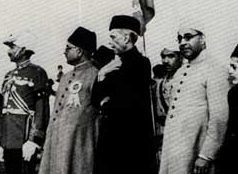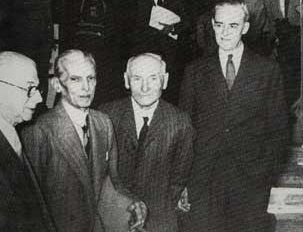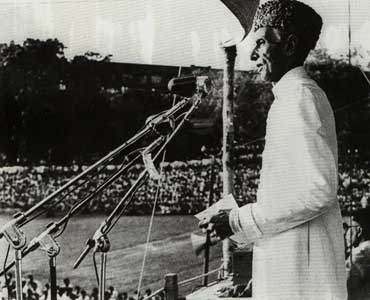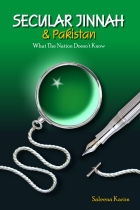|
|
|
Mahomed Ali Jinnah (This biographical page is adapted from
Secular Jinnah & Pakistan, Chapter 1, which is available to
read in full
here) Birth & education
After being admitted to the Barr at the age of just 19 (making him the youngest Indian to be admitted) Jinnah returned to India and began practising law full time in Bombay. In 1906 he joined the All-India National Congress party, which sought self-government for Indians, the same year that the All-India Muslim League also came into being, though he did not join the latter until 1913. Early politics Jinnah lived in a turbulent period when there was an increasing anti-colonial sentiment across India, while tensions were also increasing between the Hindu and Muslim communities. As the largest non-Hindu community with a long history in India, Muslims sought political equality rather than a 'minority' status. Many Indian Muslims sought increased provincial autonomy for the regions in which they lived, and separate electorates. As a believer in Indian nationalism, Jinnah was among the liberal politicians who sought to unite the two communities. His political mentors were non-Muslim liberal politicians such as Hindu Gopal Krishna Gokhale and Parsi Dadabhai Naoroji, and this no doubt influenced his political beliefs. He personally opposed separate electorates for Muslims, and he was also a centralist, but in practice he faithfully represented Muslim interests. In his very first speech in Congress in December 1906, in which a resolution was moved on the issue of Waqf-i-ala-aulad (Muslim inheritance and trust law) he expressed his appreciation that a question affecting solely the Muslim community was being raised by the Congress. Later he also took on the Waqf issue himself, sponsoring the Musalman Waqf Validating Bill through the Viceroy's Legislature in 1913. It was Jinnah's anti-imperial stance that explains why he refrained from joining the essentially pro-British Muslim League until 1913. When he did, it was because the League had brought its official rules more in line with a nationalistic programme, and that too under his personal guidance. Thereafter, through his membership of both parties, he worked for a political union of Hindus and Muslims.
Estrangement from Congress Jinnah's earliest issues with Congress revolved around the methods it employed to tackle the British. Mahatma ('Great Soul') Gandhi's revolutionary 'non-cooperation' method directly conflicted with Jinnah's 'cooperative' constitutional approach of making gradual changes for the betterment of India's people. Gandhi's first non-cooperation movement against the British government ended in the massacre of around 400 Indian unarmed protestors by British troops. The Khilafat movement for which Gandhi led a second non-cooperation movement also ended in bloodshed, this time between Hindus and Muslims, and this worsened communal tensions. In addition, Gandhi was directly involved in changing the creed of both the Home Rule League (of which Jinnah was a member) and the Congress, to reflect both a desire to fight for full independence and also to declare the right to employ 'unconstitutional and illegal' methods to this end. Jinnah permanently resigned from both parties. In 1928, the Nehru Report was published and it aimed to outline a constitution upon which all communities could agree. However the Muslim League rejected the Report, since it offered Muslims less power than they wanted at the centre, and insisted on joint electorates. Jinnah authored his famous 'Fourteen Points', containing the Muslims' bare minimum demands. Though Congress did not concede to these demands, Jinnah's efforts helped to repair a pre-existing rift in the Muslim League from the previous year. Alienation
Return and 1936 Provincial elections Back in India, the Muslim League was floundering. Muslim Leaguers unanimously elected Jinnah as their party president in his absence, and pleaded with him to return. He did so in April 1934. The following year the Government of India Act 1935 came into effect. It substituted the previous unitary system for a federal structure, and involved British Indian provinces alone. Rulers and leaders throughout the subcontinent were uncooperative for their individual reasons, and so only the provincial portion of the Act could be put into effect. This meant that Indians could introduce self-rule for the first time at the provincial level.
Congress rule
The commencement of World War II brought an unexpected end to the Congress-dominated government. In September 1939, Viceroy Linlithgow declared that Britain was at war with Germany and that India must assist in the war effort. Congress leaders were outraged that they had not been consulted before the announcement. They called for immediate independence. Linlithgow rejected the demand, and by November Congress ministers had resigned from the provincial cabinets, putting the British back in power. The League was more supportive of the war effort, a decision that would make the British somewhat more sympathetic to Muslim sentiments up until partition. The Lahore Resolution
Over the next few years, the British, the Congress and other small parties came up with several constitutional proposals for facilitating the transfer of power from British to Indian hands. Most of these schemes invariably leaned in favour of a united India. Jinnah and the Muslim League never quite committed to any of these schemes (with perhaps one exception which at any rate was not quite as it seemed on the surface. This is reviewed in detail in Secular Jinnah & Pakistan, Chapter 11). Cabinet Mission In June 1945, the Viceroy announced the British intention to 'advance India towards her goal of self-government', and that autumn, the British also announced fresh provincial elections (there had been none since 1937, owing to the War). Jinnah had fought the last provincial elections mainly with a view to ascertaining the feasibility of making the League the sole authoritative representative of Indian Muslims. This time, he stated that the League would contest the election not to win seats for a ministry, but to obtain the Muslim 'verdict' on partition. A vote for the League was to be taken as 'a vote for Pakistan'. When the League subsequently won 90 percent of the Muslim seats in the election, it passed a new resolution (Delhi Resolution) demanding immediate partition and creation of 'Pakistan'.
Independence
This biographical page is adapted from
Secular Jinnah & Pakistan, Chapter 1, which is available to
read in full
here |
Secular Jinnah
& Pakistan:
What the Nation Doesn't Know
Publisher:
CheckPoint Press, Ireland
Paramount Books, Karachi
ISBN:
978-1-906628-22-2
Book Data:
Paperback
6.14 x 9.21 inches
xiv, 318 pages
Includes bibliography
and index
What is the Munir quote?
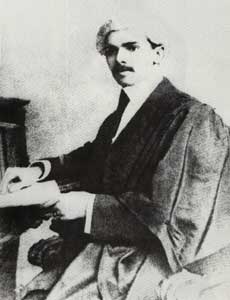 Mahomed
Ali Jinnah (born Jinnahbhai) was born in 1876 in Sindh, Karachi,
in what was then part of British India. The son of a merchant, Jinnah
went to London in his late teens for a business apprenticeship,
but soon decided to train as a barrister instead at Lincoln's Inn.
Mahomed
Ali Jinnah (born Jinnahbhai) was born in 1876 in Sindh, Karachi,
in what was then part of British India. The son of a merchant, Jinnah
went to London in his late teens for a business apprenticeship,
but soon decided to train as a barrister instead at Lincoln's Inn.
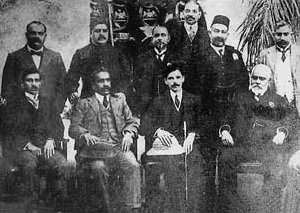
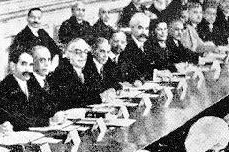
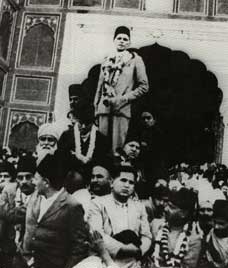
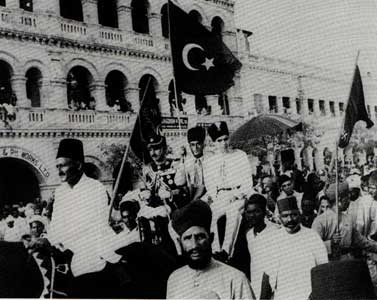 In
the provinces where it had secured a majority, the Congress now
expected the League (along with other parties) to effectively dissolve
and sign the Congress pledge unconditionally. Next the Wardha Scheme
of education, the brainchild of Gandhi, was enforced in the Congress-ruled
provinces in March 1938. Its commendable provision of free, self-sustaining
and compulsory primary education notwithstanding, it had many facets
that were deemed unacceptable to Muslims, including the inculcation
of the concept of Ahimsa (non-violence) and the introduction
of the Hindustani language (while suppressing Urdu). In addition,
the song Bande Mataram - an anti-Muslim song from a Hindu
novel - was to be sung in all schools, and all children were expected
to salute the picture of Gandhi, which Muslims considered idolatrous.
Though Gandhi's scheme did not include religious education in its
syllabus, most minority communities believed that this was nevertheless
an institute for the imposition of Hindu culture. Jinnah accused
the Congress of being 'absolutely determined to crush all other
communities and cultures in this country and establish Hindu Raj'.
In
the provinces where it had secured a majority, the Congress now
expected the League (along with other parties) to effectively dissolve
and sign the Congress pledge unconditionally. Next the Wardha Scheme
of education, the brainchild of Gandhi, was enforced in the Congress-ruled
provinces in March 1938. Its commendable provision of free, self-sustaining
and compulsory primary education notwithstanding, it had many facets
that were deemed unacceptable to Muslims, including the inculcation
of the concept of Ahimsa (non-violence) and the introduction
of the Hindustani language (while suppressing Urdu). In addition,
the song Bande Mataram - an anti-Muslim song from a Hindu
novel - was to be sung in all schools, and all children were expected
to salute the picture of Gandhi, which Muslims considered idolatrous.
Though Gandhi's scheme did not include religious education in its
syllabus, most minority communities believed that this was nevertheless
an institute for the imposition of Hindu culture. Jinnah accused
the Congress of being 'absolutely determined to crush all other
communities and cultures in this country and establish Hindu Raj'.
